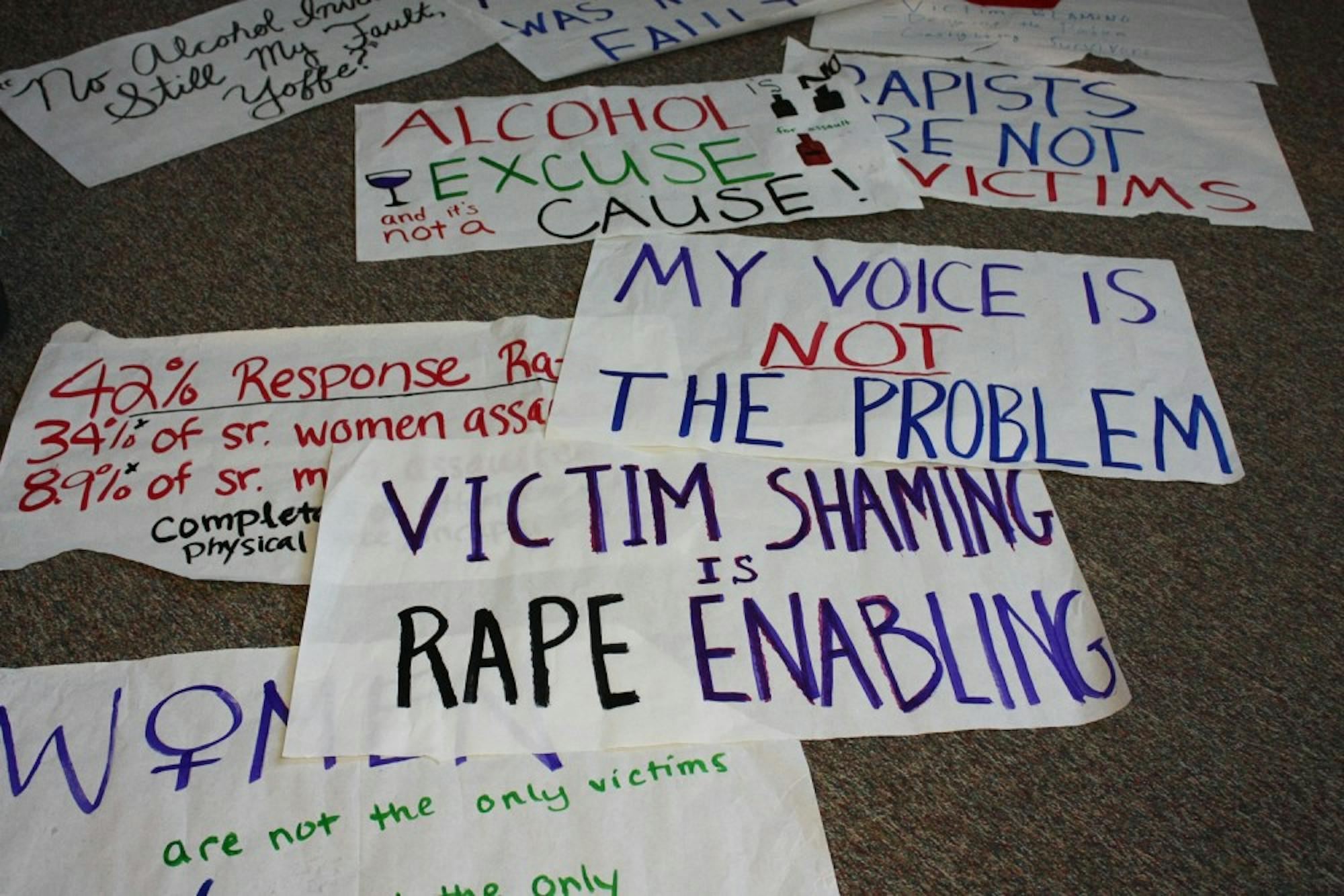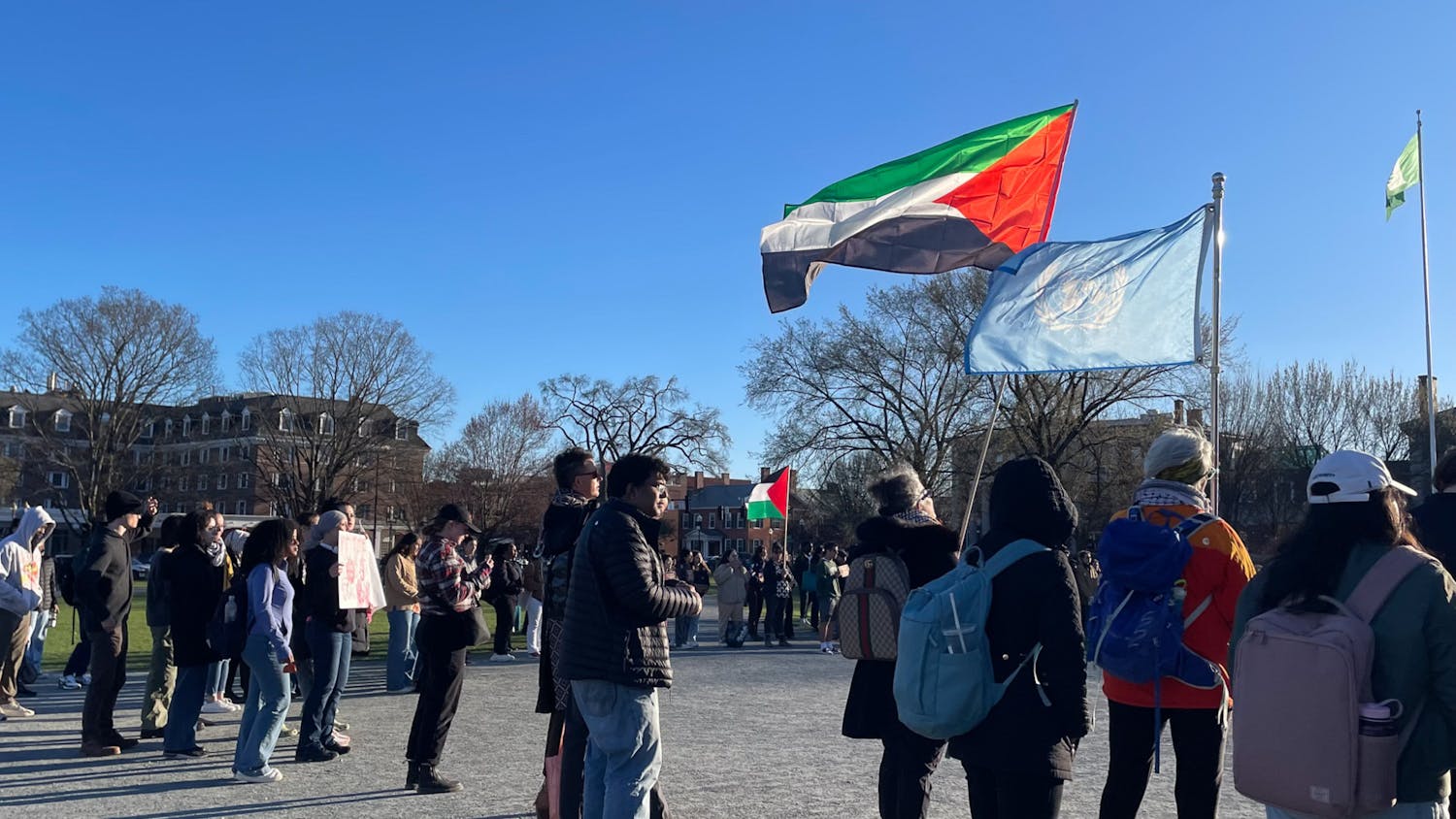Over 20 student demonstrators held signs — with slogans such as “Stop telling me my rape was my fault” and “Rapists are not victims” — during a presentation titled “The College Rape Overcorrection” featuring controversial Slate columnist Emily Yoffe on Thursday afternoon.
Yoffe pens an advice column for Slate titled “Dear Prudence” and has written frequently about gender and sexual assault.
At the beginning of the presentation, government professor James Murphy, who helped organize the event, said he did not think the event would be as contentious as it was.
Tori Nevel ’16, who organized the protest, first found out about Yoffe’s speech after reading the Vox Daily campus email, which publicizes selected campus events.
Nevel then read several of Yoffe’s articles — including those titled “College Women: Stop Getting Drunk” and “The Problem With Campus Sexual Assault Surveys.” In her article “The College Rape Overcorrection,” which shares a name with the speech, she wrote that college campuses have sexual assault disciplinary measures that heavily favor the accuser and “infringe on the civil rights of men.”
“The way that she wants to fix the problem is by saying, ‘If women stop drinking, then the problem will be over,’” Nevel said. “Telling a woman to change her behavior to avoid being raped is putting all the impetus on the victim to protect themselves, and in the same breath it is saying don’t let yourself be raped, but let someone else be raped,” Nevel said.
After creating several Facebook posts that received strong support, Nevel decided that she wanted to do more than Facebook activism and contacted several student organizations who deal with sexual assault or gender issues — Nevel herself chairs the Student and Presidential Committee on Sexual Assault — in order to reach more people. Nevel also contacted everyone who liked or commented on her Facebook posts.
After holding a meeting on Sunday with individuals and organization representatives, students decided not to host the event through any particular organization but to make participation an individual decision.
She sent out a Google survey to people who had demonstrated interest in protesting at the event. The survey featured several quotes from Yoffe’s articles and asked for people’s contact information, willingness to create posters and hold them up during the presentation, as well as an opportunity to submit a message for Yoffe if the survey respondent could not attend the event in person. Nevel sent out an email to a group of students on Tuesday asking for ideas.
One of the involved students, Katie Billings ’16, said she became part of the process after hearing her friends talk about the issue. Seven demonstrators at the event declined to be interviewed for this story.
Nevel described the College’s decision to invite Yoffe was described as a “disappointment.”
Nevel called the demonstration a “stand for survivors.” Survivors who could not be there for physical or emotional reasons would be represented by those who attended and protested the event, she said.
The point of the protest was not to censor Yoffe, or anyone, but rather to express disagreement with her views, Nevel said.
Nevel said she and other students created the signs partially in order to help represent those who were not there, but also to inspire discussion.
“We want to engage in dialogue the whole time, and that is how we are going to do it,” she said.
The students remained silent during the presentation and would raise their signs when Yoffe would make what they perceived to be controversial statements, such as when she said that there was a generational gap that has resulted in the current generation of women being weaker than the women who came before them.
The presentation was 90 minutes long, half of which was a question and answer session. During many of Yoffe’s answers, the audience laughed at some of her responses.
Yoffe said she approved of bystander training — such as that under the Dartmouth Bystander Initiative — but said training could never replace a woman knowing her limits.
She also said that the federal justice system should play a much larger role in sexual assault accusations, as opposed to colleges having to get involved.




